Items
Subject is exactly
Education--Universities
-
2020-03-24
From The Traditional to the Unknown: Moving from In-Person to Online Learning
Much like other college students in the spring of 2020, I did not know how to react to the news that a virus called COVID-19 had begun infecting major cities, towns, and people. As an avid gamer, it appeared to me as though we started heading down the path of a zombie apocalypse or something similar to that, such as the ones you see in Call of Duty. I can still remember where I was as a sophomore in college when my school decided that it needed to shut down, sending students back to their homes and moving classes to the online world. At the start of what became pandemonium, I was with my friends in one of their dorm rooms, and we watched as the former president of the school, with a panel of other officials, answered questions about the pandemic and how the institution would respond. From my perspective, it seemed that no one knew what to do, and it was disconcerting to see that the leaders of the school were themselves in a state of flux. But who could blame them? In many ways, that spring of 2020 was unchartered waters, where everyone, including our leaders, did not know what to do or how to set forth a concrete plan. The lack of certainty, as I recall, led many students to become unsure of how the school would handle classes, graduation, plans for reimbursement for housing and dining costs, and, most importantly, the health and safety of the students and faculty. From that moment in spring 2020, it seemed that the college landscape would never be the same. With that said, this leads me to the point of my story. When the school decided that all classes would go online for the remainder of the spring 2020 semester and the entirety of the following school year, 2020 - 2021, it seemed entirely new and, in some ways, scary. Never before had I taken online classes, let alone know how to operate a program called Zoom. When I read the newsletter from my school saying that the 2020-2021 academic year would be online, it seemed, from my view, almost pointless to make students do schoolwork at a time when everyone was more concerned about their health and not getting other people sick. From that perspective, I felt angry, confused, and dismayed about how online classes would work. More importantly, I wanted to know how professors would respond to the situation, hopefully having them recognize that they should not assign a traditional amount of school work for a semester course given the extenuating circumstances beyond the classroom and college. I can still recall taking my first online class, and I felt utterly lost. I did not know how to operate Zoom, I did not know how to interact with my professors and classmates by staring into a camera on my computer, and I did not know, at the start, how challenging it would be to feel motivated to do the schoolwork. The latter was a difficult obstacle to overcome as being back at home and not in a classroom made it easier to forgo doing school work for a day, creating a lackadaisical mindset that negated my ability to do my assignments in a timely manner. On top of that, not being able to physically see my professors, either in class or in their office, made it even more difficult to ask questions. As someone who typically raises an abundance of questions, it seemed to me that that was no longer possible. Having to send several emails back and forth and then only have a few minutes to speak with a professor on Zoom after or before class made the process more cumbersome. The transition from the traditional classroom setting to the unknown world of online learning was a significant curve ball created by the pandemic that made the last part of my sophomore year and my entire junior year feel less important. The online medium essentially made the coursework seem less valuable to me. Even though I lived on campus in my junior year, 2021 - 2022, at the height of the pandemic, the educational side of my college experience became impacted to such a degree that I found myself not as engaged about the work or the course material. To that end, I share this story because it is one of many about how the pandemic took a substantial bite out of educational processes from 2020 into 2021. The classroom never felt the same during the pandemic and when I was on campus in 2021. Everywhere was a ghost town. In many ways, having to go from the traditional classroom into the expansive world of online learning was not something I thought I needed to think about as a college student. Of course, no one could have predicted what was going to happen, making the situation during that time all the more difficult to accept. I look back on it now and realize that I did lose a year and a half of my college experience. It is an unfortunate outcome of the pandemic, but I am thankful that no one in my family passed away from the disease, and all of my friends were safe as well. I wish I could relive my sophomore and junior years as a regular college student. However, having gone to college in the midst of the pandemic is historic, and I want to tell other generations about this experience. It will be challenging for future students to know what it was like to go to school at the same time a rampant disease spread across the globe. On the flip side, I think going to college during this time shows resiliency and courage on the part of many people. I hope this story is one that many can relate to as we move forward from these troubling years and continue to grapple with the legacy caused by the pandemic. -
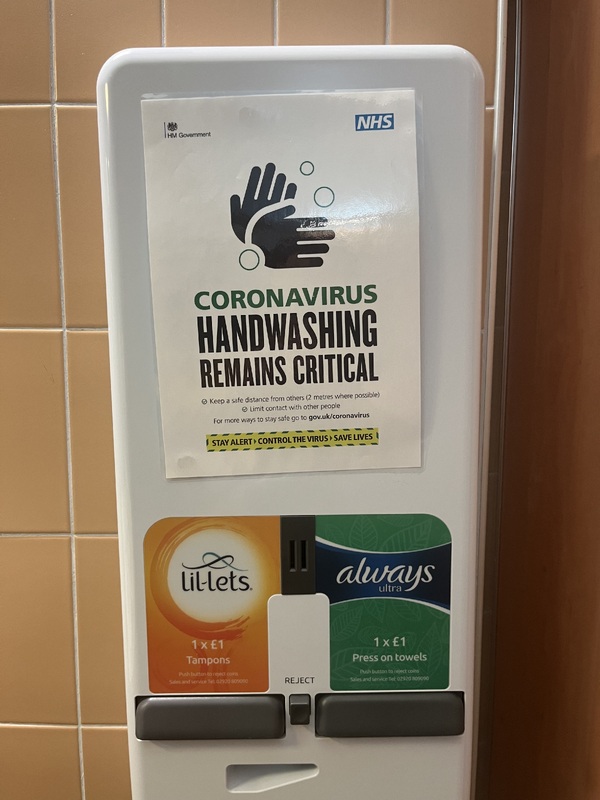 2024-06-18
2024-06-18Handwashing @ the National Records of Scotland
It is summer 2024, I am visiting Edinburgh, Scotland for a study abroad class with ASU online MA history students. Today, I am working at the National Records of Scotland. As I visited the loo before I headed upstairs to research, I noticed this sign reminding staff and the public to continue washing their hands to reduce the spread of COVID-19. I hope that none of our students/staff get COVID while here and that it is a mild strain if they do. It feels like a phantom on the past, but one that could certainly reappear unexpectedly. -
2024-05-09
COVID 19 zero contact
The pandemic was the worst for me to be honest because I couldn't take a class that was designed for on campus. Because of that, I had to drop the class and wait for campus classes to be available so I could learn better in the classroom settings. I was depressed because it was my first time dropping a class since I started college in spring 2018. I had to wait for the next semester to retake the class which held me back a semester . I'm happy I got out of that stage which took me a while to get out of. I had to go to work regardless of what was happening in the pandemic because I was working in a retail store at the time and wasn't allowed to stay home like other people. Until you have COVID and you submit your doctor's note to get two weeks off. The new rules that were made for the retail stores cause people to fight because of a cough or a sneeze was just overall depressing. The news was very depressing because older people in the nursing home could see their loved ones before they die or hug them for the last time. Nurses couldn't go home to their family because they had to work long hours and they did not want to carry any disease home to their loved ones. 2020 was No bonding time at this moment. -
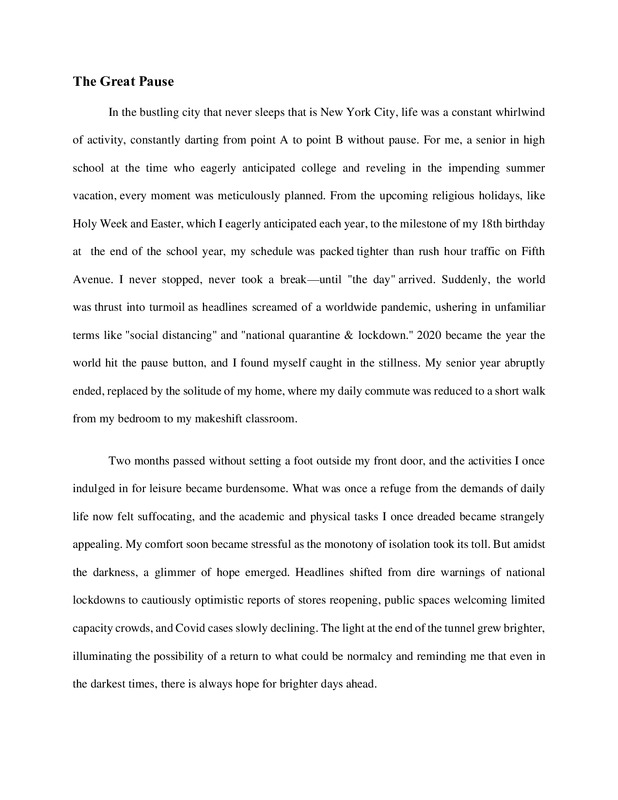 2024-05-07
2024-05-07The Great Pause
This story depicts my personal experience from the start of the pandemic up until the start of college. This narrative of this experience in my life was very important because the pandemic instilled a deeper appreciation for life's moments and a renewed sense of purpose, guiding the journey through college and beyond. -
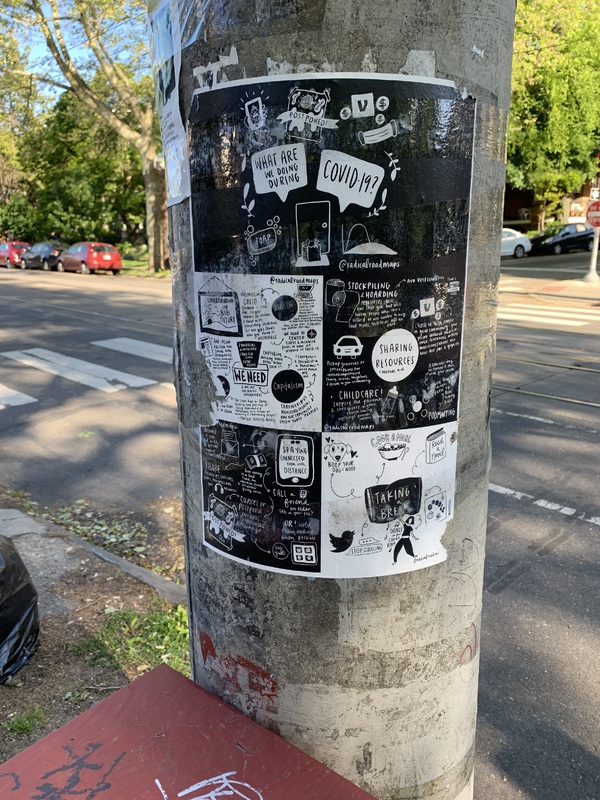 2020-04-20
2020-04-20Experiencing Covid in West Philadelphia
As lock down and social-distancing mandates were initiated in the spring of 2020, I was living in a tiny apartment in West Philadelphia. At the time, I was finishing my dissertation, which is a historical account about the ways in which another pandemic, HIV/AIDS, impacted the lives of children born with the disease, their families, and the healthcare workers that cared for them. Given that my entire life – work and personal – was crammed into a roughly 400 square foot apartment, I began taking long walks through the area of West Philly where I lived. These walks were mostly meant to help my mental health – sometimes they worked, other times they did not – and to relieve my cabin fever. From roughly March through June of 2020, I began taking photos of pandemic-related things that appeared on my walks. Save for my photo of the empty Target pharmacy shelves, the pictures – along with my journal entries and a small collection of pandemic-related ephemera – were an effort to document how the pandemic impacted my small part of the world. I also took them as a way to help me remember this era-defining event. -
2020-11-14
The Plague Wedding
My husband’s cousin got married outside Cincinnati, Ohio in the fall of 2020. The invitation said the event was outdoors, and we expected it would be small. My husband and I drove his mother across multiple states so she could be there for the ceremony and celebration. We had some hope that people were being mindful of pandemic precautions, as most establishments required employees and patrons to wear masks in shared spaces, and there were plenty of signs, paid advertising and graffiti, that suggested locals were disappointed by the botched handling of the pandemic to that point. Spray paint scrawled over a Trump campaign poster reading “Trump lied and my mother died” was especially memorable. When it came time for the actual wedding however, all hopes that the wedding guests would be responsible were quickly dashed. Ignoring signs and pleas from the woman at the hotel’s front desk, guests waited for the “party bus” in the hotel lobby, maskless and chugging White Claws, then leaving the empty cans for the same woman to clean after the bus arrived. We had hoped that these guests were going to a different wedding, but when it became apparent we were all going to the same place, we opted to drive ourselves to the venue, not wanting to be in close quarters on the bus to and fro with these fools. The small, intimate wedding we were expecting to attend had over 150 guests. The ceremony was outdoors as the invitation mentioned, but the reception was zipped up in a large party tent, and the only ones wearing masks were the three of us. I took a picture of the guest list, not so I could remember at which table I was supposed to sit, but so I would know who to sic the Health Department on when I inevitably tested positive for COVID in the following days. -
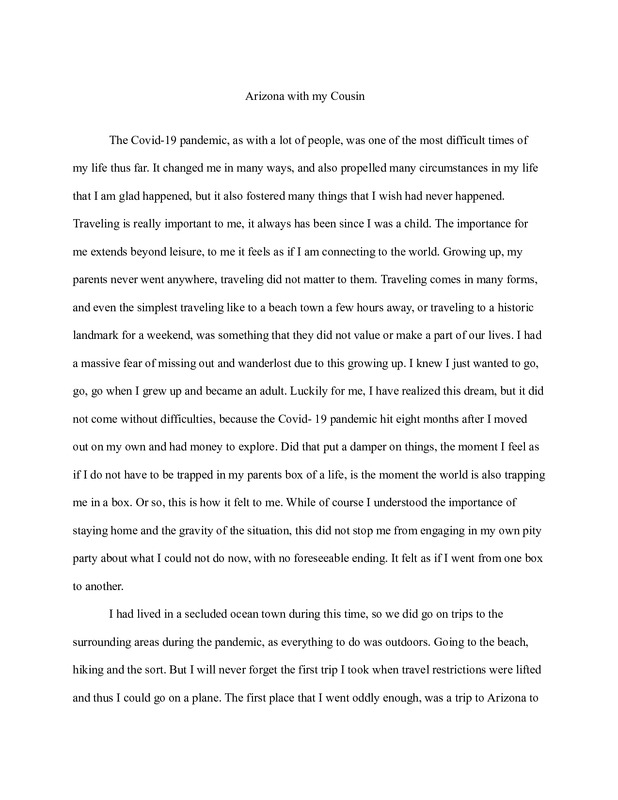 2021-05-20
2021-05-20Arizona with my cousin
This is a story about the first time I traveled post COVID restrictions lifting. This story comments on how isolating the pandemic felt to many of us and thus the importance of traveling once we were able to. This particular story is important to me because it was the first trip I had taken by myself as a newly moved out adult. -
2021-07-01
Falling In Love With Chicago
As the world slowly emerged from the grip of the COVID-19 pandemic, life began to regain a semblance of normalcy. With restrictions lifting and vaccinations becoming widely available, my family eagerly embraced the opportunity to reunite with loved ones and explore the world beyond the confines of our home. After our children became eligible for the COVID-19 vaccine, my husband and I decided to embark on a memorable journey to visit family in Chicago. The decision was influenced by the fact that Illinois had taken the pandemic seriously, and the situation seemed relatively stable. The excitement in the air was palpable as we packed our bags and set off on the adventure. The journey itself became a testament to newfound hope and optimism, a stark contrast to the anxiety-ridden days of lockdown. The rhythmic hum of the Amtrak train and the gentle swaying of the carriages created a soothing backdrop to our anticipation. After almost three days on the train, we finally reached our destination. As we settled into the rhythm of Chicago life, we found ourselves enchanted by the city's rich history and vibrant culture. The streets echoed with the footsteps of generations past, and the architecture told stories of resilience and progress. Our children's eyes widened with each new discovery, absorbing the lessons of the past and the beauty of the present. The museums became classrooms, and the parks transformed into playgrounds of learning and exploration. From the towering skyscrapers to the serene shores of Lake Michigan, Chicago opened its arms wide, inviting our family to immerse ourselves in its tapestry of experiences. Over the course of two weeks, we marveled at the diversity of the city, the pulsating energy of its neighborhoods, and the friendliness of its people. The world-class museums, the iconic Millennium Park, and the deep-dish pizzas became integral parts of our family's collective memory. The reluctance to leave grew with each passing day, as Chicago had become more than a destination; it had become a second home. The connections made, the lessons learned, and the memories forged painted a picture of a city that had welcomed our family with open arms. As we boarded the Amtrak train to return home, a mixture of gratitude and nostalgia-filled our hearts. Chicago had been a beacon of joy and discovery during a time when the world needed it most. The journey had not just been about a visit; it had been a transformative experience, a reminder that even in the face of adversity, there was always the possibility of finding beauty, connection, and a sense of belonging. The trip to Chicago amid the COVID-19 pandemic symbolizes a shift from a period of uncertainty and isolation to one of hope, reconnection, and exploration. That being said, the nervousness still set the undertone to the trip. The eligibility and administration of COVID-19 vaccinations mark a significant turning point in our family's ability to travel. It really shows the importance of vaccines as a tool for regaining a sense of freedom and the ability to engage in activities that were restricted during the height of the pandemic. The exploration of Chicago's history, culture, and landmarks communicates our desire for new experiences and rediscovery of the beauty in the world. The trip became almost like a metaphor for the broader human experience of seeking joy, adventure, and learning, even after enduring a period of hardship. As we chose to travel to a location where the pandemic was taken seriously, it is clear the new considerations the pandemic has led families to consider. This almost suggests that communities and regions that take the pandemic seriously create an environment that fosters a sense of safety and encourages responsible travel. We were so grateful to get to travel to Chicago, and it is undeniably one that we will remember forever. -
2020-03-03
Pandemic Honeymoon
Our wedding was on Leap Day, February 29th, 2020. The honeymoon followed shortly after with still whispers of a pandemic possibly looming. It was the newlywed phase of ignorance, but the pandemic was still viewed as something that wouldn't happen. We first went to Napa Valley without seeing one person wearing a mask in public. Traipsing around vineyards and imbibing on wine also helped stave off reality's harshness. When we arrived in San Francisco for the week, we realized maybe this was bigger than we realized. Walking the busy and heavily inclined streets, you would see about 50% of the people wearing masks and whipping out their hand sanitizer every so often. However, once we started walking through Chinatown, that number nearly doubled. Still, we somehow were not phased. Why would we be? We were on our honeymoon with an endless supply of matcha ice cream, dim sum, walking, sights to see, and more walking! The city was still bustling and alive; you could barely notice the Grand Princess cruise ship loitering in the bay for days, waiting for permission to dock that never came. The cancellation of a Warriors game? Oh well, our boat to Alcatraz was still ready to set sail! On the last day of our trip, we noticed a couple of restaurants closing early, with one owner asking, "Don't you know what's happening?!" On the last day of our trip, we decided to take the long drive home and go down the Pacific Coast Highway, stopping at Monterey and Carmel-by-the-Sea. In walking the streets and making our way to Monterey Bay Aquarium, we were shocked by the sight of people in hazmat suits spraying the exterior doors of the building. This image would later replay on the news once we made it home. They implemented strict lockdowns and travel restrictions within the hour of crossing back into Arizona's borders. We were so lucky we made it back home just in time and didn't realize until we made it home just how oblivious and ignorant we were. Looking back, I cringe at our naivety. Those concerned people wearing masks in Chinatown? Some of them would later become victims of racism due to COVID fearmongering. That ice cream shop we frequented? Vandalized and destroyed. That curious cruise ship at the time claimed seven lives and infected over 100 people. Once we were home safe and realized this pandemic's seriousness, we stayed home. Within a couple of weeks after returning home, we found out we were expecting, bringing even more intensity and fear. The carefree attitude and carelessness, as exhibited on our honeymoon, were now met with complete awareness of the pandemic and the strictest adherence to lockdown guidelines. We didn't travel again until our pandemic baby was two and a half years old—all of the innocence of life before COVID was forever gone. -
2022-03-11
Post Covid, Yay Hawaii!
When the COVID-19 travel restrictions were lifted, our family immediately headed for Aulani, A Hawaii Disney Resort – this was already planned as a Christmas gift (‘21) for Spring Break (‘22). In fact, upon arriving, we found out that the lockdown for the island was going to be lifted the very next day. So masks and other PPE were not necessary when moving about the exterior hotel. In fact, events around Oahu (Polynesian Cultural Center) were also relaxing C-19 measures for tourists and all guests. Small precautions were still in place, like one family in the elevators at a time, no character meet and greets (with full contact), and masking indoors. Due to Hawaii being landlocked, the importance of C-19 measures meant we all had to do our part to stay covid free. We were happy to do whatever it took. Our memories of this trip were refreshing. It was nice to get out of the house and to the islands (not the desert where we are from), experience and learn the culture of Hawaii, take in a little dose of Disney, and be mask-free, even with precautions being taken in some areas (which we were okay with). -
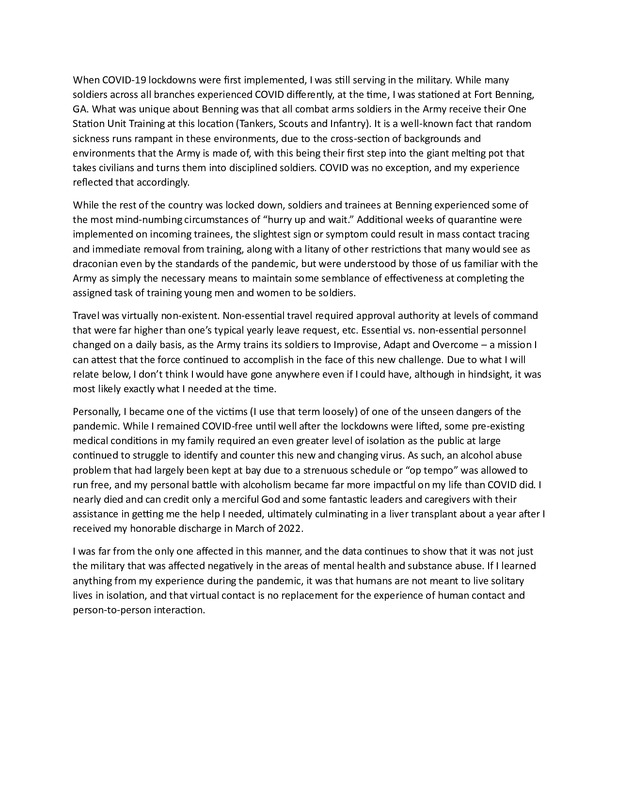 2020-03-31
2020-03-31Locked down, Locked in
I was a SSG in the US Army when the lockdown hit. The isolation let my personal demons almost get the best of me, but lessons were certainly learned and I pray we never get to that point ever again. -
2023-10-12
No Longer a Traveler
The pandemic has altered the way I view and interact with people and places. Although I have always been cautious of germs, illness, personal space, and keeping healthy, the pandemic has heightened my awareness. I am now turned off and disgusted by the thought of crowed spaces, movie theaters, gyms, airports and other places with heavy traffic. I no longer have interest in activities I once enjoyed and participated in. This has affected how I travel and how often. I once loved traveling, visiting new places, trying new restaurants, interacting with communities, and just being a “tourist”. After the pandemic restrictions were lifted, I had no interest in traveling and enjoyed being at home. Home was comfortable and safe. The first time I traveled after the pandemic was in 2022, I traveled to California to attend a conference, visit some museums and to do touristy things. I did enjoy my experiences, but it was truly exhausting. I was constantly worried that I had caught COVID or that I was going to catch it. By the end of the week, I was ready to go home and recover from the anxiety I had. It has been a year since that trip. -
0023-10-12
Happy Mother's Day 2021
In May of 2021, after nearly eighteen months of being apart, I was finally able to visit my mom and dad in Spokane, Washington. After driving five hours across Washington state, I finally arrived at my parents house. To say the least it was a very emotional greeting. When I arrived we greeted each other with many hugs and tears. Throughout the day we would just give each other random hugs, happy to be together again. My parents live in a retirement community that was very careful and followed the Covid recommendations to keep the residents safe. I was considered an essential worker as a grocery store worker. I didn't want to take the chance of exposing them to the virus since I worked closely with the public until I received the first vaccine. I also have two sisters that live in Spokane and were able to see them too. We still had to wear masks in most areas but that did not matter. Getting the family together, after such a long time, was all my mom could ask for on her special day. Happy Mother's Day. -
2022-06-30
The Road Trip 2022
Road Trip During the heat of covid, the spring of 2020 through the fall of 2022 I worked for our local school district in Arizona. My family and I did not do a lot of traveling beyond the necessary during the mandated restrictions. After the bulk of the restrictions were lifted and vaccines were widely available I participated in a work trip to San Diego to attend a convention. My partner and I decided to springboard off this and turned the summer into a west coast road trip to visit with friends and family. We started in San Diego and the highlights of this trip were Portland, Oregan, Seattle, Washington, and San Jose, California. On our jaunt along the coast there were still precautions being taken. Many people still wore masks out and were positioned with more space in public. Of the people we visited and stayed with on our journey, some were still social distancing, and taking precautions when going out. Our adventure was a good way to reconnect with the people we hadn’t been able to see during the lockdown. My partner and I were able to visit some important places from my childhood and have some epic picnics. There is a lake and small national park near my Grandparents’ home that is open to the public. The tree cover and water line is cut with an easy hiking path. We got to traverse about a mile of it. Taking in the beauty that could easily have been featured in a fairy tail description of an ancient forest. It was a great way to break the isolation and share some of the past with my partner. -
2021-04
Regret for a Trip Not Taken
This story is about travel that did not happen, but should have during the Covid-19 Pandemic. In mid-2020, my little sister Sarah was diagnosed with kidney cancer. She was married and had 3 children up in Seattle. When my family heard the news, travel was severely restricted and many people were still dying daily from the virus. I have my own wife and kids, so we all agreed that it wasn’t a good risk to go and visit. Besides, we reasoned, she hadn’t started treatment yet and she had good chances of beating cancer. So we waited it out. My sister and I talked frequently, and she told me that she was optimistic about her cancer diagnosis. Unfortunately, our Dad died in January of 2021 due to complications related to Covid (he had Parkinson’s also), and neither of us could travel to do any funeral service. In April of 2021, the pandemic had cleared up enough that most travel restrictions had ended, everyone was vaccinated, and the risk was lower. My older brother Sean had planned a trip to go to Seattle and stay there for a month to visit, help take care of kids and just be there. He urged me to go, at least for a week or so because he told me that he thought it wasn’t going as well with her treatments as Sarah had led me to believe. Because of Covid patients overwhelming hospitals, I don’t think she was getting as much good-quality medical care as she needed, though that’s my opinion. Anyway, I didn’t want to go on this trip. I don’t particularly handle death and dying well, and I didn’t want to go there and be basically sad and crying the whole time, and I was in denial about her health, so I didn’t go. A few months later, in June 2021, Sarah succumbed to cancer and died. If I could go back in time to do it over again, I definitely would have gone. I would have liked to walk around Seattle with her and take pictures to put on Facebook, our primary means of sharing memories, or take her kids out for a few hours to sight see and get to know them better. I regret, and always will, that I did not go and see her and her family there at the end. -
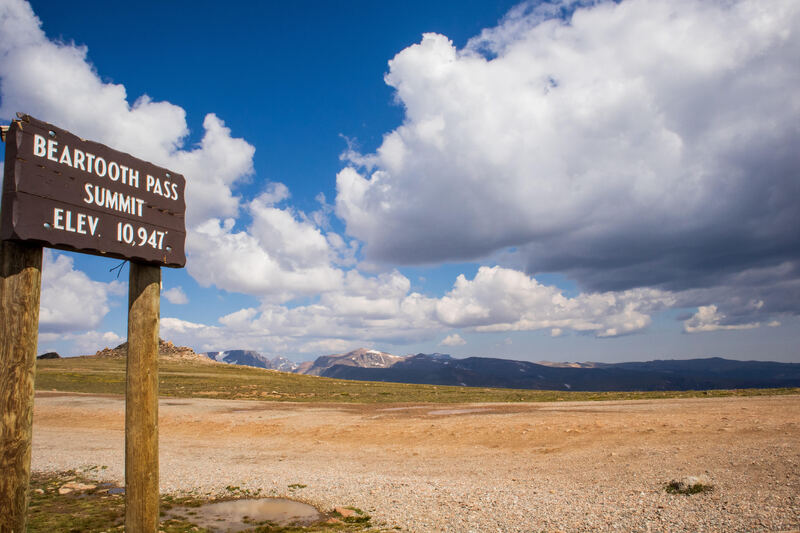 2020-07-28
2020-07-28Beartooth Pass
In late July 2020, my wife (then girlfriend), my family, and I took a trip to Sturgis, South Dakota for the annual Black Hills motorcycle rally. During the trip, we traveled to Red Lodge, Montana, where we spent two days riding our motorcycles into Yellowstone National Park. Of all the memories we made on that trip, driving on Beartooth Pass, one of the most dangerous roads in the United States, was my favorite. The views were stunning and the ride was exciting, with near-vertical dropoffs and few guardrails. In South Dakota, the only COVID-19 restriction in effect was mask mandates inside restaurants and stores; in Montana, there were no restrictions. -
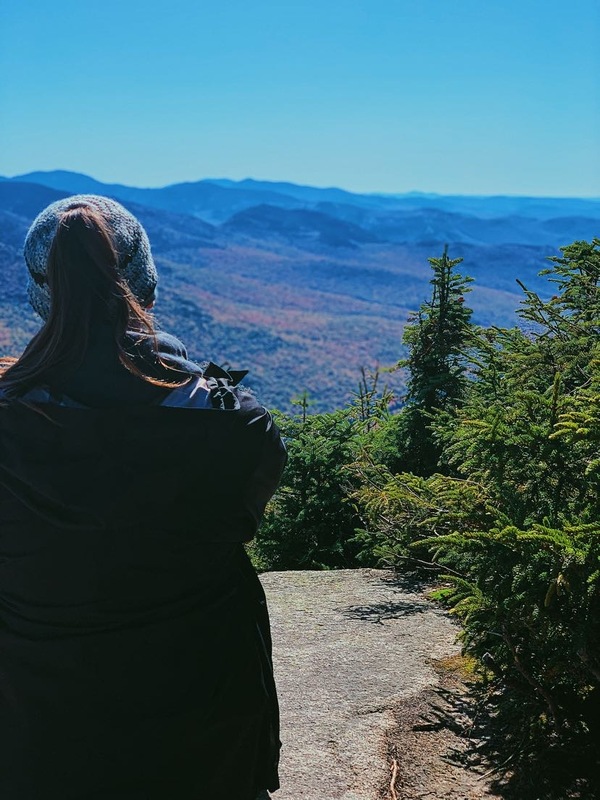 2020-05-08
2020-05-08Scaling Mountains - Overcoming Obstacles (and New Englands peaks) During the Covid-19 Pandemic
During the pandemic, I was lucky that I didn't lose anyone close to me. I know many people around me and in the world who watched their loved ones die from COVID-19. It has also had long-lasting health effects on many people as well. It is an ongoing conversation because people are still contracting the virus daily. Lockdown was a surreal moment for many in our ordinarily fast-paced world. The entire world stopped, and for once, we couldn't rely on our usual entertainment and schedules for distraction. This led to the development of new habits, which, unfortunately for me, were not just board games and binge-watching Netflix. Alcoholism had been at my doorstep since my senior year of high school, with my dependence on the substance worsening as the years passed. This is a genetic condition, and I have had countless family members struggle and die because of substance abuse, mainly alcohol. When the pandemic hit, I drank nearly every day, and this continued during lockdown with my roommate and a few friends. Not only was this dangerous because of the spreading pandemic, but it also worsened my mental health. Soon, my college shut down, and I had to move back home, where my substance abuse continued. My relationship had fallen apart when my ex moved back to India as he was on a student visa. The drinking and emotional isolation/strife led to a breakdown wherein intrusive suicidal thoughts plagued me. Something had to change; one night, I quit all substances and contacted my PCP about a mental health evaluation. I know my diagnosis was wrong, but it got me on the medication I needed to forget the intrusive thoughts and piece my life back together. My saving grace was my father and, eventually, my friends, who decided to pick me up and give me a distraction. This distraction became hiking mountains, a shared hobby of previous substance abusers. The chemicals released in the brain during these hikes and the physical exercise filled the void alcohol used to. It served it and began to heal the void left by years of mental health struggles and abuse. Like in this picture, the world's problems and my own seemed small when I was on top of a mountain. Not only that but also hiking is a very social-distance-friendly activity. The love for hiking fostered in my childhood was rekindled during the pandemic and remains one of my favorite things to do. My father and I are attempting to walk up all New England's notable peaks. -
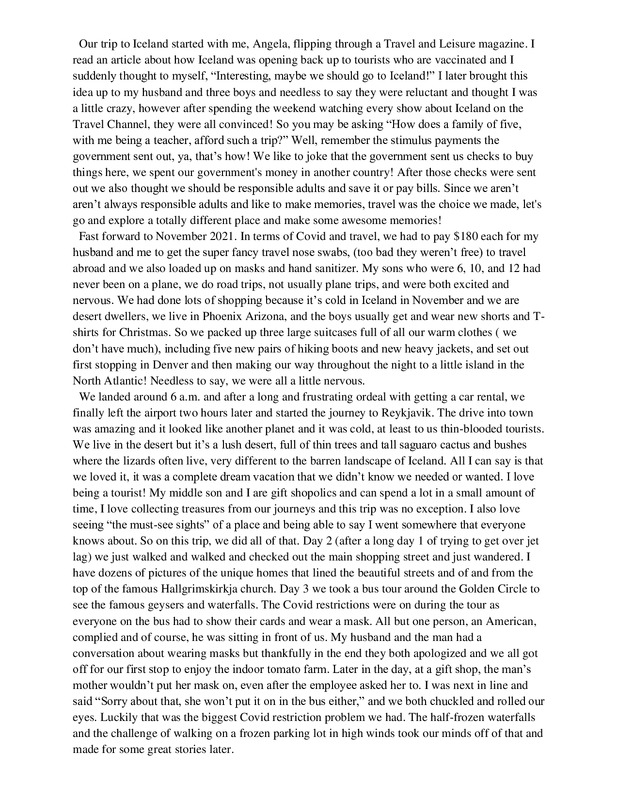 2021-11-19
2021-11-19Our Adventures In Iceland
I've written a story sharing our Covid trip to Iceland that we were able to take after the restrictions were lifted. I don't think we would have gone if the circumstances were different, it was a life-altering trip for us, something joyful in the midst of a world crisis. -
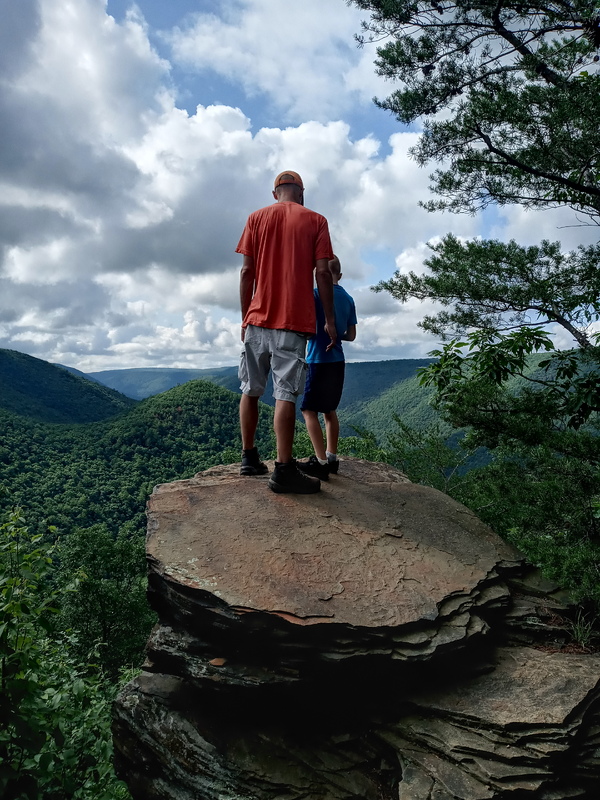 2021-05-15
2021-05-15A Measure of Peace During a Global Pandemic
During the COVID-19 pandemic I was working in health care for an agency. This meant that I traveled from facility to facility where there were staffing shortages and predominantly worked in the covid units. It was a strange experience to travel across Pennsylvania during this time and have little to no traffic that would typically have existed were there not any restrictions enacted. Therefore, when the restrictions were lifted, I did not feel an urge to travel to any great extent as I never stopped working during the lockdowns and if anything, my hours were significantly increased to the point of constant exhaustion. However, when the restrictions were lifted, I found myself in need of outdoor therapy. I am an avid hiker and enjoy the silence that trails offer. I have found that my favorite trail to visit is the Golden Eagle Trail, or as my children refer to it “Rattlesnake Ridge.” While the restrictions were lifting in most places at the time, I hardly noticed because in health care they remained for a much longer period. On many occasions in 2021, my family accompanied me to the Golden Eagle Trail to step away from society and unwind as a family without feeling the pressure of all the changes that were brought about by the pandemic. These trips provided me with lasting memories of my son reaching for my hand for security when walking along a thin train with a steep drop alongside it, my husband helping steady me across slippery rocks, and more. The photos from these trips are everlasting reminders of the happiness that hiking, especially with my family, bring me. Moments like these are to me the important moments in life. -
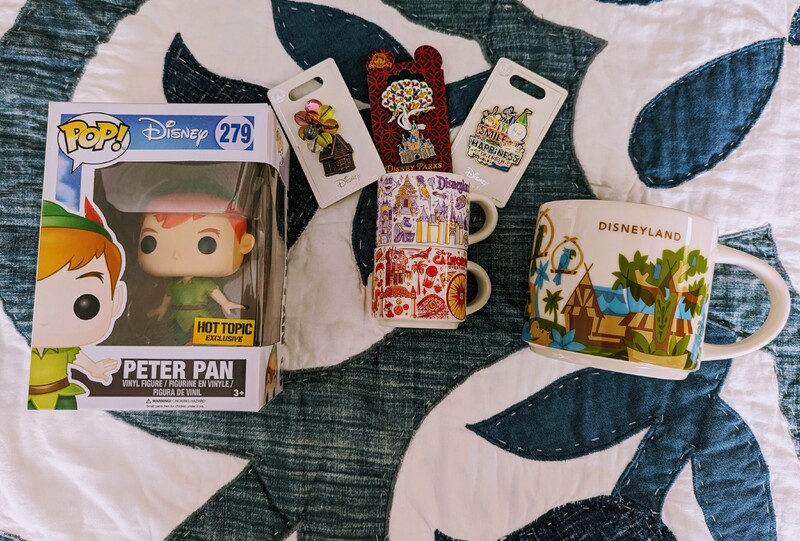 2022-03-07
2022-03-07Regaining Adventure in Disneyland
My family and I were very cautious during the pandemic and waited a long time before we chose to travel both as individual families and as an extended family unit. We finally decided to travel with a family trip to Disneyland. We have a wide range of ages in our family from over sixty-five to under ten years of age and we wanted to find a place that would have something for everyone. We appreciated the fact that at Disneyland the vast majority of the vacation would be spent outside and we all live relatively close to the location helping with travel anxieties. The fact that the place is excellently maintained helped lessen many of my family members' fears of going out for the first time. The time was very enjoyable and everyone had a wonderful time. There was still the lingering fear of not wearing a mask at all times and walking around the park without a mask did take some getting used to however it was a wonderful way to reenter the world of traveling. In reference to the photograph that I placed in the archive - The photograph does not show the park or us on the trip due to keeping our privacy. However, it helps to represent what this trip meant to my family and myself. The Disneyland Starbucks mug and pins represents the fact that we often bring back souvenirs from our trip in order to remember our time together. The Peter Pan funko is to illustrate the adventurous spirit, joy, and freedom that we had been unable to experience during the time of Covid restrictions. Finally, Disneyland holds fond memories of family, joy, and adventure as a child so it was wonderful to re-enter that world on my first experience back traveling after the exile imposed by Covid. -
2020-08-22
Yellowstone Park in 2020
It was in the late summer of 2020, and we thought that we would have the whole park to ourselves by going during the pandemic. We were wrong! It was as busy as it usually was, however people were keeping their distance from each other, and everyone was even more courteous than usual. The park required masks inside the buildings, but didn't enforce it outside. Many of the usual amenities inside the buildings were closed, and they were working with a skeleton crew. When we were waiting for Old Faithful to do its thing, many people were keeping to their own groups rather than packing in to see the geyser as they typically did before social distancing was a thing. -
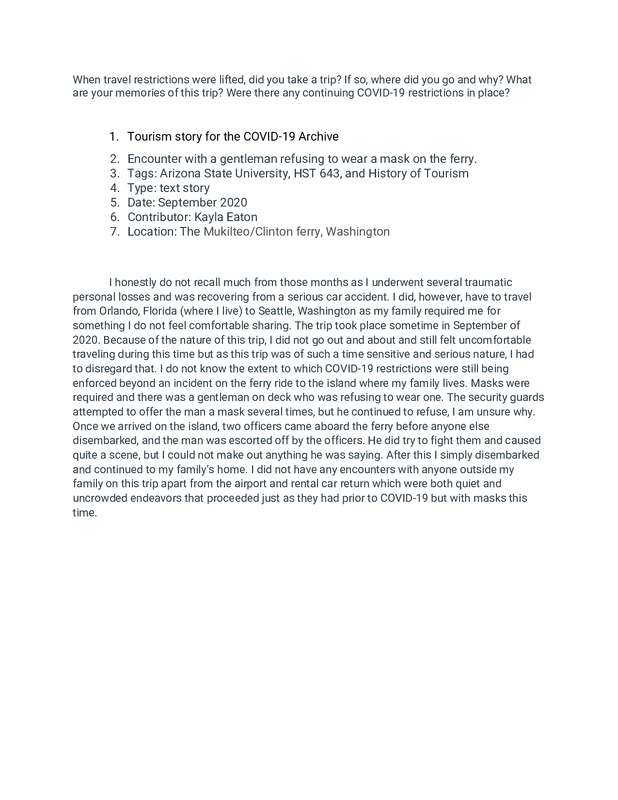 2020-09
2020-09Tourism story for the COVID-19 Archive
I am submitting a short antidote regarding an individual being upset by being asked to wear a mask on a ferry. This could be important to show how some people resisted COVID-19 restrictions, but this event's importance to me is nonexistent. -
2021-06-20
Norrish First Visit to old Home Post Covid
In the timeframe of the slow lifting of restrictions from the Covid 19 pandemic and shutdown, my family and I were less inclined to engage in travel, at least originally, than we had been before the pandemic. The luxury of just having the freedom to meet with local friends and re-engage in the simple pleasure of taking in a movie at the theater or going shopping at the mall were enough. Eventually, desire to see family that had been cut off from us because of the pandemic encouraged me to take the plunge and fly to visit my sister in my boyhood home state of Wisconsin, a place I had not visited in over twenty years. The plane trip itself was a strange mix of familiar experiences such as checking in my luggage and going through airport security combined with new experiences of wearing a mask in the airplane at all times while regularly using hand sanitizer whenever interacting with people or objects potentially infected with Covid 19. Despite being personally vaccinated, the act of traveling in this way felt both isolating and risky. To be masked up while still being in such a confined area as an airplane after the isolation of staying mostly at home for most of a year felt like a flimsy defense against the potential threat from Covid 19. Isolation from one another still seemed to be the new norm for people, with minimal conversations between strangers. Otherwise, the flight itself was uneventful. Once in Wisconsin, my sister and I spent most of the time visiting locations of my childhood. Places such as our former family farm now owned by a distant cousin, or the creek I learned to swim in or the elementary school I had attended before moving away to Arizona, which had been turned into a recycle center that looked more like a dump than a school. Much of our time was spent talking and reminiscing about the past. Essentially reconnecting in person rather than through text messages or the occasional Zoom call. When we traveled to more public locations such as restaurants, a local baseball game, or Fourth of July fireworks, it was apparent that despite health protocols being strictly followed in locations like airports, local mask regulations had been greatly relaxed. While essentially all staff members were wearing masks, the majority of patrons tended to be without masks. While hand sanitizer was available in the restroom, it seemed fewer and fewer people were using it. It was once again a strange combination of familiar experiences such as ordering a meal with the overtone of pandemic restrictions such as staff masks hovering over your shoulder like a ghost, present but less and less substantial. Overall the trip itself was enjoyable, but was mostly an opportunity to reconnect with family while at the same time reassuring myself of the relative safety to be able to travel once again. Eventually, as more restrictions were removed and the increased access to vaccines made Covid 19 less of a fear and more of a nuisance, other family trips to tourist destinations such as San Francisco or Disneyworld became once again a normal part of travel for myself and my family. But my first trip after restrictions began to relax, there was definitely a reminder that the reality of Covid still hovered over our heads, even as we began to move closer and closer to new normal in our post-Covid world. -
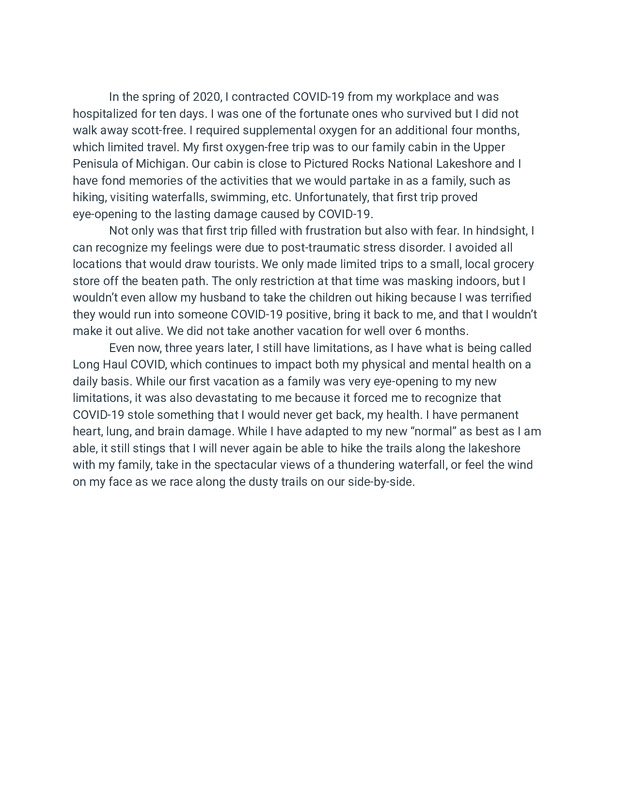 2020-08
2020-08Memories are Like Waterfalls; a Post-COVID-19 Recovery Vacation
As a survivor of COVID-19 with long-lasting damage, this memory still brings feelings of anger and fear to the surface. It takes place at a family cabin that was the epicenter of many happy memories all the way from childhood through becoming a parent myself. That first trip back forced me to see all that COVID-19 had stolen from me and would continue to steal from me for the rest of my life. -
 2021-04-28
2021-04-28Til' Death Do Us Part
I've included a text story and video of the first time I traveled since the the massive Covid lockdown in March 2020. This text and video are important to me because not only was it a brave thing to do after being confined for so long, but it was also a defining moment in my adult life. I am now married as a result of that trip. -
2021-06-08
First "Post Covid" Trip
After travel restrictions were lifted, my family and I took a trip to Pigeon Forge and Gatlinburg, Tennessee, for an early summer vacation! While we spent most of our time outdoors in the Great Smoky Mountains, we did go to a few “indoor spaces,” such as Dollywood Amusement Park, The Island in Pigeon Forge, Anakeesta, and various restaurants. We visited in June of 2021; the most evident restrictions still present were in Dollywood. While there is always a restricted number of tickets available for Dollywood due to fire and safety protocols, when they opened up after Covid, they had a very limited number of tickets to give more space and distance for the customers in the park, which was nice! There was not much waiting in lines for rides, stores, or concession stands, and we were able to keep our distance from other people. While a few smaller stores asked for masks, masks were not mandated in the two cities or any of the places listed above, and no other types of restrictions were evident in the area. My family and I did our best to stay safe and comfortable during this time and to keep the people around us safe. We chose to spend most of our time outside, surrounded by nature and wildlife! -
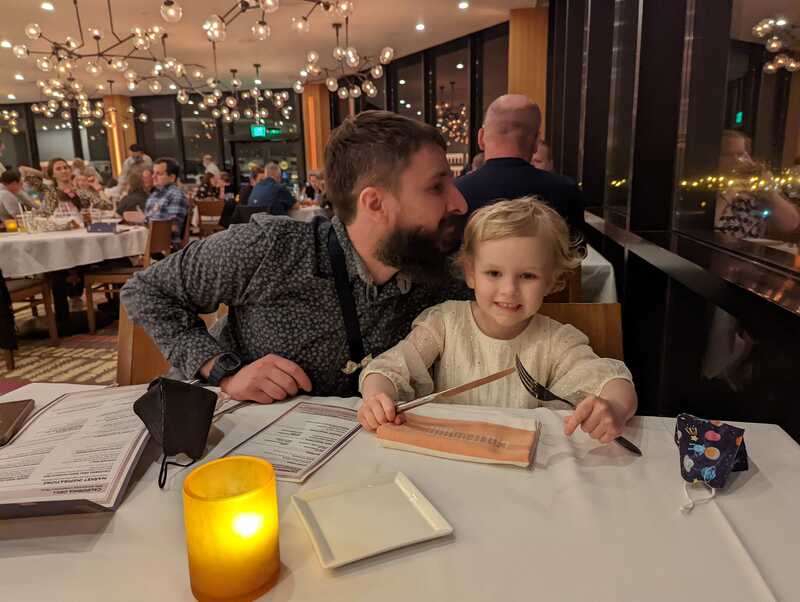 2021-01
2021-01Our COVID Trip to Disney World
In January 2022, my family of three escaped the cold of the Midwest for a much-needed vacation in Disney World. We had actually planned to go in May 2021 for our daughter's fourth birthday, but had to reschedule due to unforeseen circumstances. So we went on a seven day, seven night trip during the slowest season for theme parks to avoid large crowds. We had a really good time but soon learned that Disney World is anything but relaxing! There were still COVID restrictions in place, but mainly just optional masks and social distancing guidelines. My husband and I were much stricter about our safety than others may have been, and took great care to ensure that were were all wearing properly fitted KN95 masks. We scheduled rides on the My Disney Experience app to avoid lines. We also used hand sanitizer constantly and brought an enormous bottle with us to refill our travel-sized containers. We all stayed perfectly healthy, likely due in part to the extremely limited crowds. On some days, we were able to walk right onto rides. -
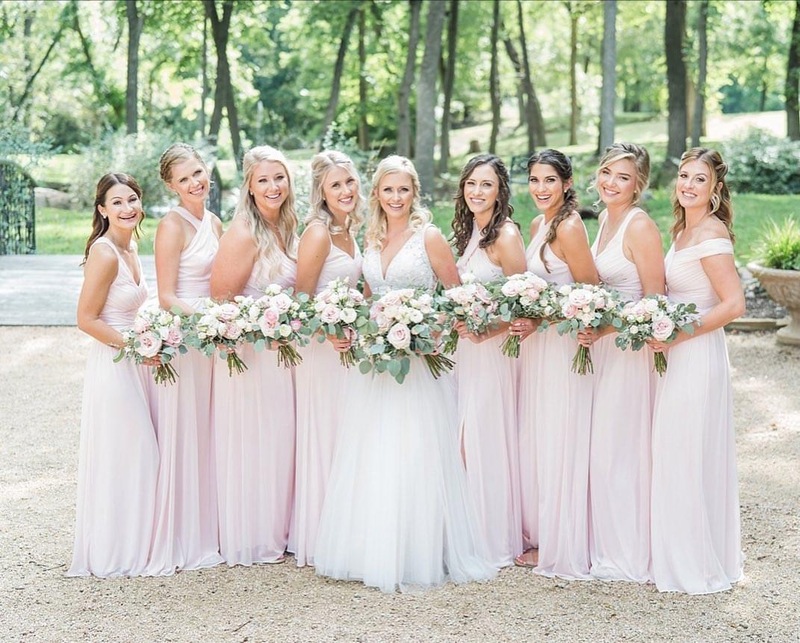 2020-10-03
2020-10-03With Love
When travel restrictions were lifted, did you take a trip? -
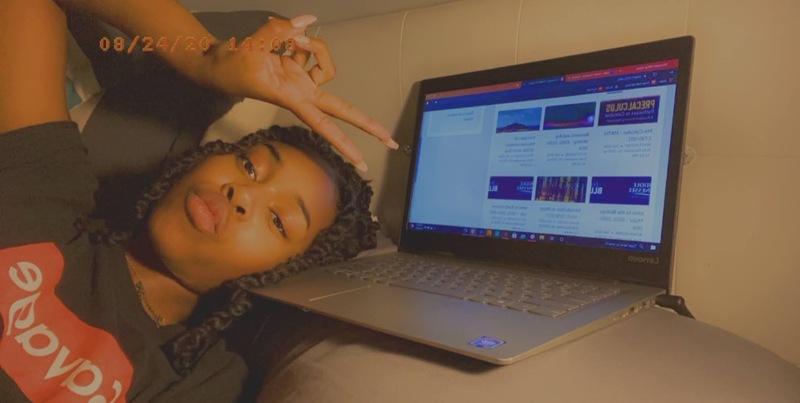 2020-08-24
2020-08-24First Day of School Picture
The picture I chose to add to the archive is my first day of school on August 24, 2020. In this picture, I was laying in bed with my laptop because everything was online. If you were lucky, you got a professor that taught class on Zoom. That is the closest to being in a regular classroom as it got. You were able to see your classmates (if they turned their camera on), you could have discussions with everyone, ask the professor questions and get immediate answers. On the other hand, you could get stuck with a professor who chose to use youtube videos and websites instead of teaching. These were the worst, poor to almost no teacher-student interaction, just discussion boards and Google. It was impossible for me to learn like this, I felt like I was not being taught! It was always stressful when trying to do assignments for classes like this because I did not understand the curriculum. If I needed to contact my professor, I just had to send an email and hope they would email me back soon with answers. Sometimes, I would not get a response until days later, a few times I never got a response. After a while of this, I started to feel miserable, stressed, and depressed. My grades started getting lower and lower and knowing how much school costs, knowing that I was going to lose my grants and scholarships because I was failing, I started having anxiety attacks. In my head, I kept saying, “I cannot learn like this, I know I am going to fail, so why keep trying?” Things got to a point where I would open my laptop, look at my assignments, cry, and then just close my laptop back up. I lost all my motivation and I lost sight of my dreams to be an optometrist. I remember the day that I dropped out, the defeat that I felt, feeling like a complete failure. -
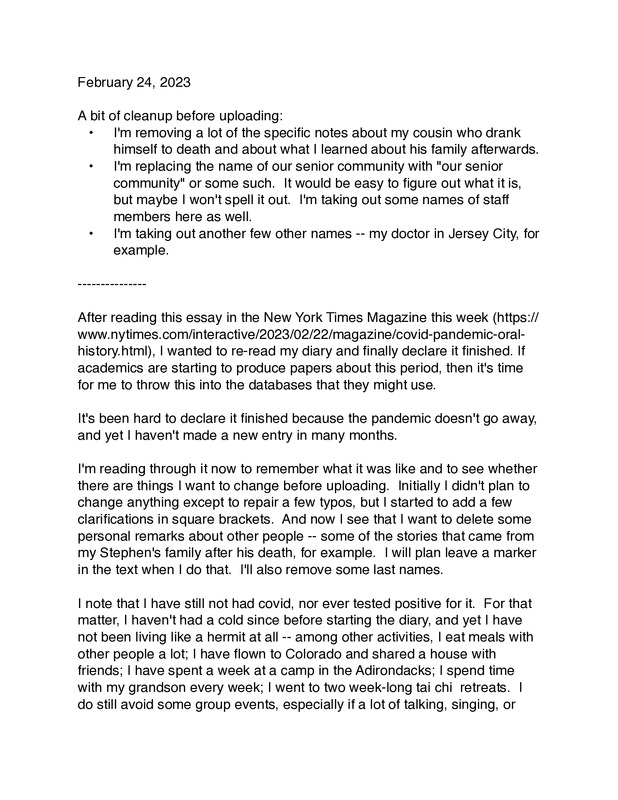 2020-02-25
2020-02-25Covid journal, 2020-2023
From the beginning, I was aware that this was a world historical event and I wanted to be very attentive to how it played out, both in the news and in my personal life. I read that diaries were scarce in the aftermath of the 1917 pandemic, so it could be useful to scholars to create one this time. I reviewed it before submission, and it reminded me of many things I had already forgotten. Once I started in February 2020, I wrote every day until mid-2021, when entries began to thin out. -
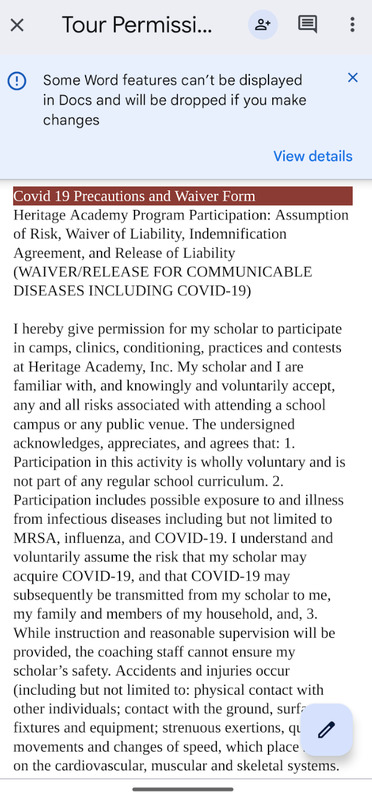 2022-03
2022-03School Trip to New York COVID-19
As a school, we take a trip to New York and Boston every other year. We had planned to take a trip in October 2021 but many of the venues in New York were still closed so we had to postpone until spring 2022. Even then, there were still a lot of students who did not want to get the vaccine that was required to enter all indoor venues at the time. We had to split the trip so those without vaccinations could go later when the mandate was lifted. There were still mask mandates and we had to present our vaccination cards at every venue. Despite the restrictions though, we had a great time in New York. -
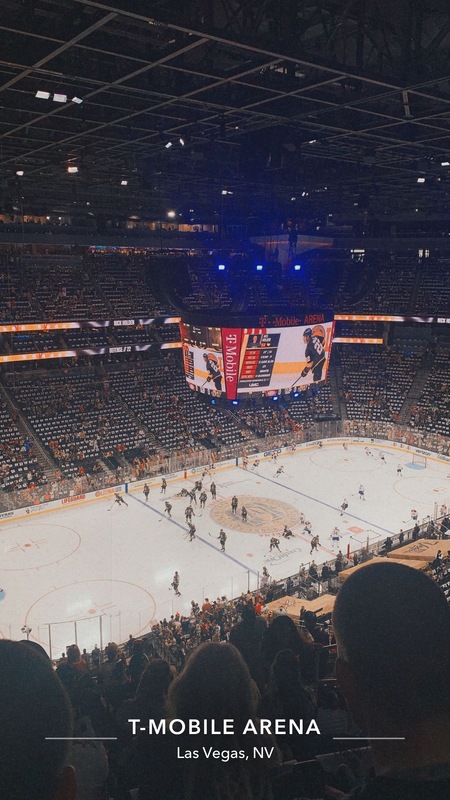 2021-06-16
2021-06-16Golden Knights vs Canadiens Game 2
I am a huge hockey fan and going to games was definitely something that I really missed during the pandemic. Once my family and I were fully vaccinated we were able to travel to Las Vegas and see playoff game. As a result of Covid-19, the NHL only had a 56 game season in 2021 and teams were placed in new divisions and the playoffs had some changes to its formatting, hence the weird matchup of Golden Knights/Canadiens in the Stanley Cup "Semifinals." The Golden Knights lost 3-0 but overall, it was still a really fun experience because I had never been to a Stanley Cup Playoff game before. There was still many Covid-19 restrictions in place during this time, but if I'm remembering correctly these restrictions were more prominent when I returned in December, especially at the arena. -
2019-12
HIS 643-44605: Story on Tourism
Following the lift of COVID-19 restrictions, many people traveled for fun, adventure, or as a celebration of renewed freedom. However, I did not travel following the coronavirus and have never traveled outside the surrounding states. There are many reasons for this, but some of the primary reasons are that I am young, my parents never traveled, I have not had the money to travel, and the idea of traveling is scary. However, the older I get, the more I want to travel and not stay in the same space. There are so many places I want to travel when I can, that it is almost overwhelming. I want to travel to Italy, Greece, Sicily, France, Germany, Denmark, etc. I want to see David by Michelangelo, the Louvre, Santorini, Neuschwanstein Castle, Tivoli Gardens, etc. The sites I would want to visit are based on important historical and cultural sites. I would want to make the most of any place I visit, and I would spend every waking moment doing something. I would document my trip primarily through photos, videos, and physical evidence of my visits. I really enjoy collecting brochures, maps, stickers, post cards, etc., from places as a physical record of my trip. I hope to one day travel. -
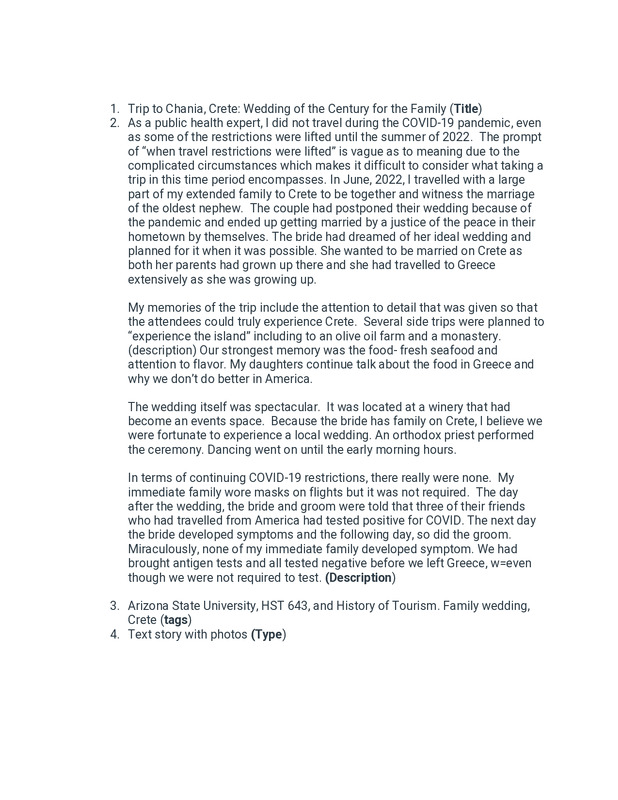 2022-06-12
2022-06-12Trip to Chania, Crete: Wedding of the Century for the Family
This was the first travel for me and my family when COVID-19 restrictions relaxed to a thoughtful degree. This is important to me because it was a time that my extended family came together and the appreciation of that was heightened by the absence of togetherness through out the more critical time of the pandemic. -
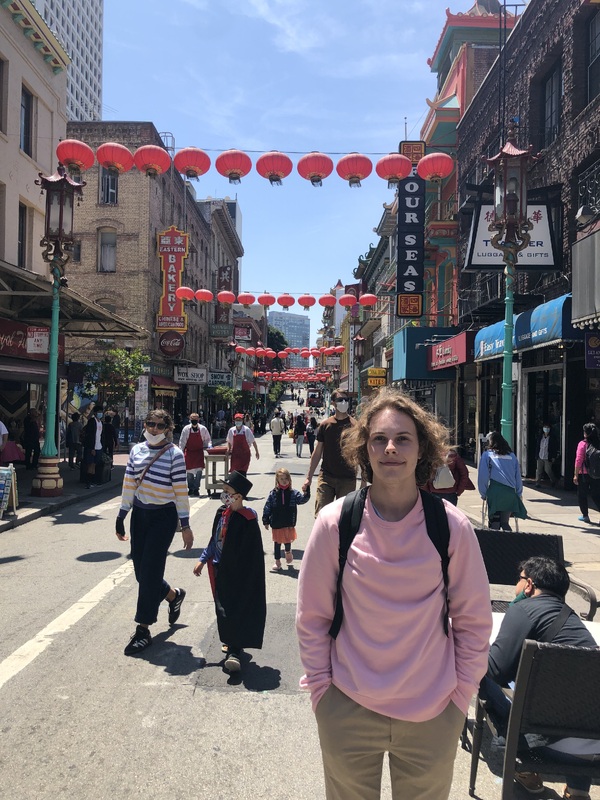 2021-07
2021-07Trip to San Francisco July 2021
During the summer of 2021, my girlfriend and I traveled to San Francisco for a week-long vacation. Travel and business restrictions were greatly lessened but still in place. As seen in the photo masks were still very common, especially in a big city like San Francisco where there was less anti-mask sentiment (my mask was off just for the photo). We wore masks for the majority of the trip, including while on planes and trains or in any public space. One of the bigger impacts of the pandemic that we experienced during our trip was how many restaurants and other businesses closed at earlier times than before. Additionally, while our trip was happening the 2020 Tokyo Olympics were finally occurring after all of the delays to its start. We were able to watch many events from our hotel room that would have otherwise occurred a year prior. -
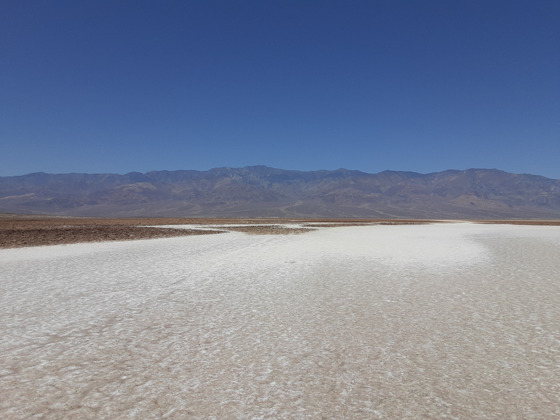 2021-05-05
2021-05-052021 National Park Road Trip
In May 2021, my friends and I took a 17 day road trip out west visiting 7 national parks, and several national forests and state parks. It truly was the trip of a lifetime. We had been planning the trip in February of 2020 but then COVID happened and we delayed it to the next year. To document our trip, I submitted pictures from the trip that I made in 2021. Some of the highlights are Death Valley National Park, Yosemite, and Zion. This was my first time traveling west of the Mississippi so I loved experiencing the culture, food, and meeting the people who lived in many different regions of the US. When I went, there were surprisingly very few restrictions other than having to wear masks at the occasional business. I do remember in Zion the staff told us to stand "1 condors wingspan apart" even though its wingspan was about 10 feet. I took hundreds of photos and I unfortunately could not upload all of them so I picked these ones. This trip was very important to me because it represents the places I've been, and the memories I have made with my best friends as we experienced this amazing trip together. Finally, I should mention that I went on this trip and missed my in person college graduation ceremony, and I don't regret it for a moment. -
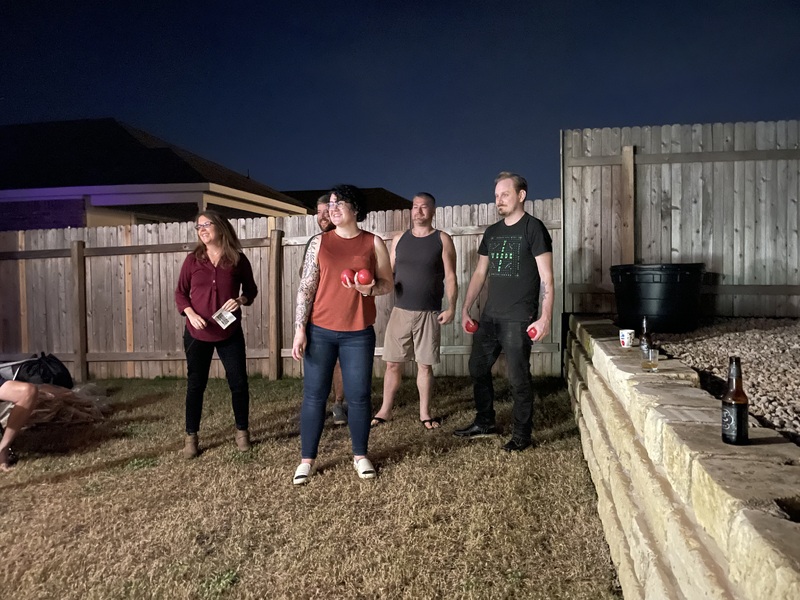 2021-12-25
2021-12-25Immunocompromised at Christmas
The impact of COVID-19 on travel and tourism over the past three years has been significant, and in my experiences, travel for me in post-COVID era has been wildly different - as my mind swirls around a large concern that I could possibly do harm to my immunocompromised husband. He’d experienced major spinal and heart surgeries in the summer of 2020, and the following year a round of COVID left his nervous and immune systems permanently weakened. My parents had planned a large family trip in May 2021, and my thoughts continued to swirl around the potential for another round of COVID afflicting my husband. I had us cancel. Months later, my family finally convinced us to get on a plane for Christmas to Austin, Texas to see my sister’s new home. It would be our son’s first flight, too, which only added to my anxiety. It was December 2021, and most restrictions were still in place at airports at this time. I was grateful for the number of passengers on the flights, in the airports, and in public transportation hubs utilizing masks and maintaining distance from one another. I recalled seeing one family, completely maskless, at the airport. They seemed so out of place - and to be honest they looked very uncomfortable - too. Luckily, like us, my extended family was hesitant to explore the hustle of downtown Austin, so much of the trip was spent with everyone at my sister’s new home, cooking, reading, completing puzzles, and most importantly: getting her lawn familiarized with several dozen rounds of Bocce ball. It was the first time we were all able to come together after the start of the pandemic, and I felt grateful for the opportunity to be with my family in the same safe space. We got way too competitive, but the laughter during Bocce proved the most memorable part of the trip. I loved how happy my family looked in this moment, especially my sister (front in orange) and my husband (over her right shoulder). I am not sure what the future looks like for COVID and travel, but for me, I know that it already looks different - I will continue to mask, I will distance, and I will choose options that will do the least amount of harm to those I love and the people I may meet along the way. -
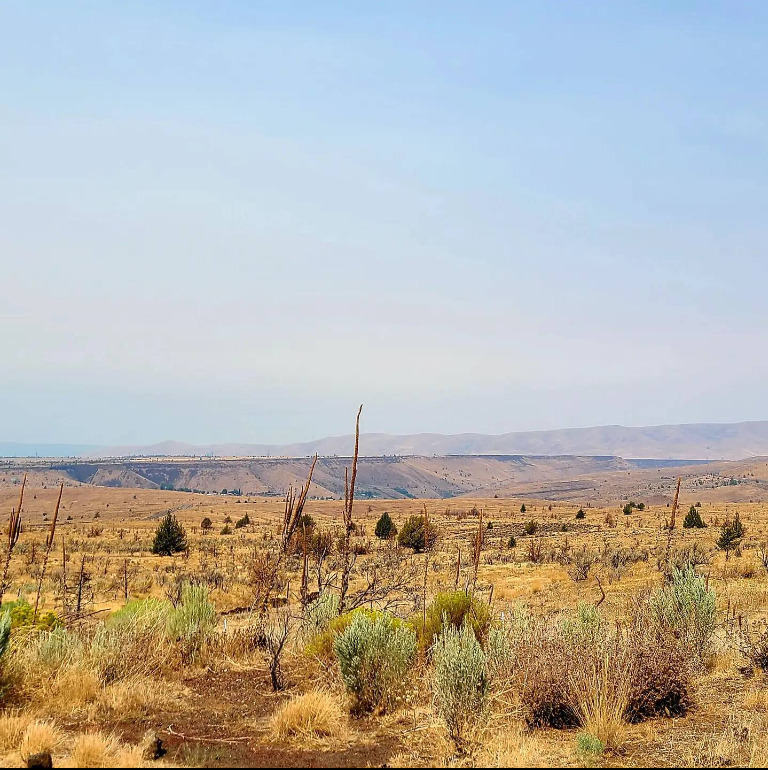 2021-08-15
2021-08-15Pandemics, Wildfires, and Climate Change
The Covid 19 Pandemic is and was a transformative event representing history in the making. The state of Oregon and particularly Portland witnessed a trifecta of converging crises beginning with the lockdown on St. Patrick’s Day in 2020. That summer was one of the hottest in recorded history and saw the city and state divided in smoke-filled chaos. The literal last words of “I can’t breathe” uttered by George Floyd were being chanted in the streets downtown as wildfires raged in all corners of the state, set against the backdrop of a global pandemic. Everything felt surreal and the tension in the city was like a powder keg. By the following summer some advancements had been made, the first round of vaccinations administered, but the same underlying issues were present in Portland. Houselessness, fractured political ideologies, and Far-Right and Far-Left members clashing in an invisible maelstrom on the Willamette River. My husband and I had adhered to the very stringent guidelines and protocol set by both the city and state to the letter. For a bit of context, my husband worked on the front line as a department manager at a grocery store and wore a mask for eleven hours at a time often six days a week for a year and a half, while I volunteered at the Red Cross and held down the home front. In August of 2021, we finally decided that we needed to get out of town, so we grabbed the dog and set a course for the Crooked River in Central Oregon. It was a two-week period of sheer peace and glory bookended by fear and anger at the negligence of fellow humans. We camped on the river and practiced mindfulness and being present every day, breathing deeply the fresh air ushered in by a strong breeze from the East. The “going there” and “going home” portions were marred by anti-mask protestors with weapons arguing about state’s rights, as death toll numbers were rising. The fires had already burned over a million acres with no signs of slowing down, and the reality of Portland’s social justice issues did not disappear just because we did. The experience left us feeling gratitude for the opportunity to explore, our good health, and open minds, it was our 18th wedding anniversary, in which porcelain is traditionally given as a gift. Ironic, given the fact that not only is porcelain extraordinarily beautiful but also incredibly delicate, a perfect representation of the state of things during the summer of 2021. -
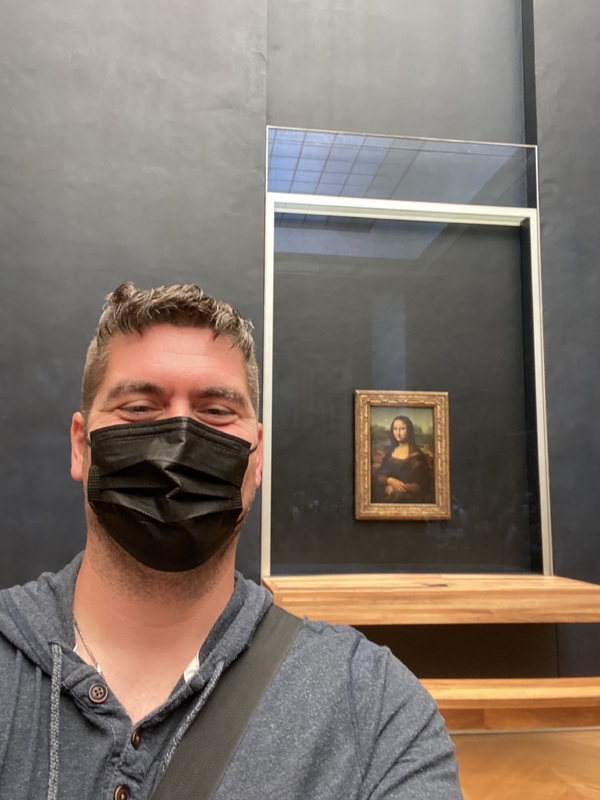 2022-06-03
2022-06-03First Student Trip After COVID-19 Pandemic Began
I have led a student global travel trip for the last 10 years at my school. Because of the COVID-19 outbreak in 2020, our trip to Australia and New Zealand was delayed/cancelled until 2021 in hopes of COVID being over by then. I had 27 students have to postpone traveling on this trip. In 2021, we came across the same restrictions, and our trip was cancelled again. As we we were planning our 2022 trip, New Zealand still had quarantine rules that would have kept us in the hotel for a week before we would get to go anywhere or do anything. Due to this, we changed our trip to one to France, Switzerland, Germany, and Austria. My students wanted to travel again, but did not know what to expect. There were still masking rules in place in a lot of the places we visited, and everyone had to take a mandatory COVID-19 test to be able to leave Europe at the end of the trip and get back into the United States. This was the scariest part because if your test revealed you were positive for COVID, you were required to stay in the country until you were negative. Everyone on the trip dreaded the day of the test because we had heard so many stories about other schools on different trips that had students who had failed the test. The trip was extremely important to me because it represented these students being able to fully restart their lives and finally be able to be kids again. This is a picture of me from the Louvre waiting my turn to see the Mona Lisa. It was taken immediately after I took a picture of all my students in front of the painting. I can see the happiness in my eyes again, getting to see students do something they love to do. -
2021-06-01
Post-pandemic Beach Trip
Unlike most people that we knew, we did not travel anywhere during the pandemic. We did not have any visitors outside of our family and continued to use social distancing until the restrictions were lifted. When the world opened up again, we still chose to stay fairly close to home. At the time, we were living in Harrisburg, PA and decided to visit Virginia Beach. We stayed at the Hilton and were shocked to see how to the pandemic had effected the tourism industry. The hotel was wildly understaffed as they had let many employees go over the past year and it was chaotic. The rooms were not cleaned on time for check-in so there were people packed into the lobby, bags everywhere, just waiting to get to their rooms. The employees were overworked and mostly rude; wholly unlike how it had been pre-pandemic. When we were finally able to check into our room, we got onto the elevator and found that there was some kind of liquid all over the floor. We tried to show an employee but there were none around to help. After getting into our room, we pulled out the sofa bed to find that it was full of sand and that the room had not been properly cleaned. Eventually, someone did come up to clean it but it took hours. Our trip could be summed up as unrelaxing; nearly every employee seemed as though they were at their limits. There were still mask guidelines in place and all of the people there seemed angry about it, whether it was because they were wearing one and others weren’t or because they did not want to wear one and were angry that the guidelines told them to. It seems as though no one could be satisfied and everyone was inconvenienced no matter which side they were on. -
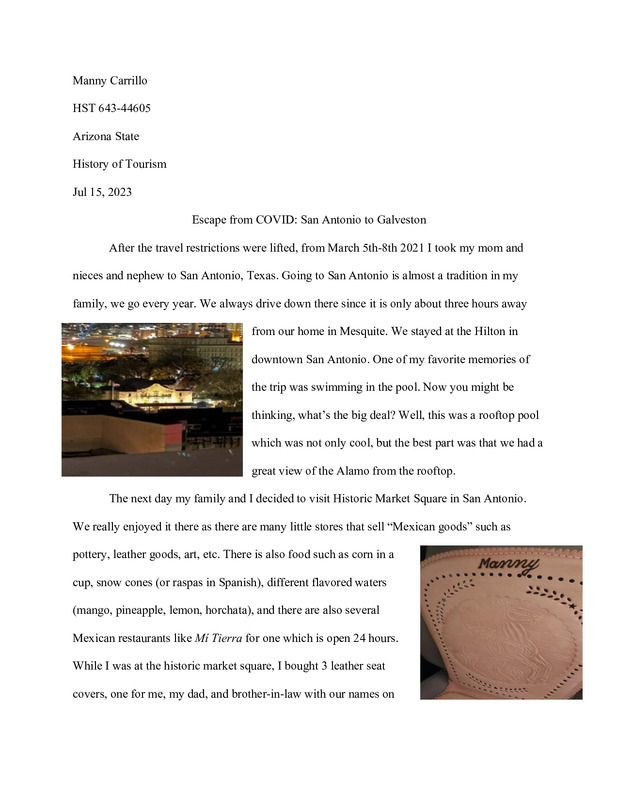 2021-03-06
2021-03-06Escape from COVID: San Antonio to Galveston
I submitted this story because I wanted to explain what my first trip after COVID was like. -
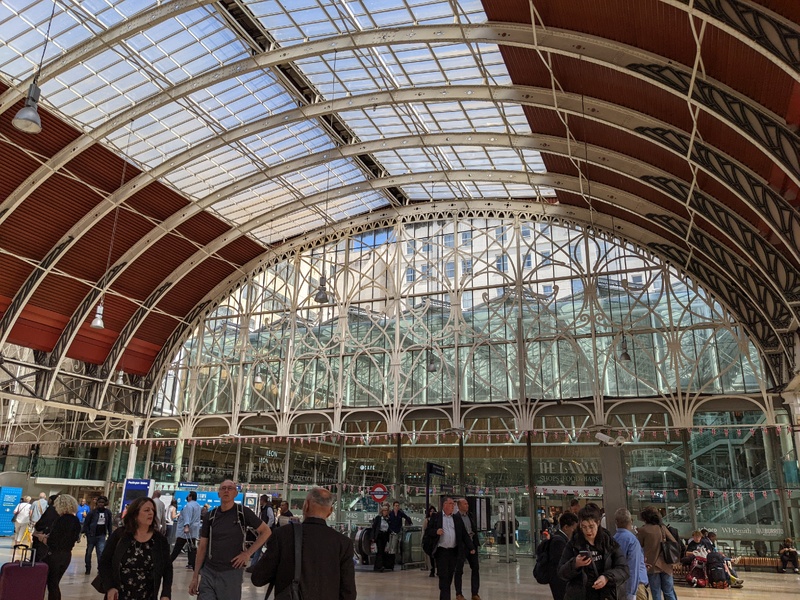 2022-06-12
2022-06-12Eurostar station in London, June 2022
During my honeymoon, my husband and I were in London, Summer of 2022. We had spent two weeks there and it was time to take the Eurostar train through the Channel Tunnel to Amsterdam. What particularly struck me was how serious the ticket agents and French government officials (the train must enter through France) were about Covid-19 Vaccine Record Cards. If someone did not have their official government-issued Covid vaccine certificate, they were absolutely not permitted on the train. It was very serious and made me anxious, even though I held on to mine tightly, along with my passport. We waited in the entry line for 40 minuets to an hour to get to the check point, the guards were very intense and scrutinized every passenger, and we eventually entered the train on to our destination. This was the first trip we had taken since the pandemic began, and by this time Europe and parts of Asia were opening back up for tourism. Many people we saw in London and Amsterdam at this time were no longer wearing masks, and since my husband and I were vaccinated, neither did we. We had an amazing honeymoon and I am grateful that the pandemic was slowing down and the countries we visited were accepting tourists. -
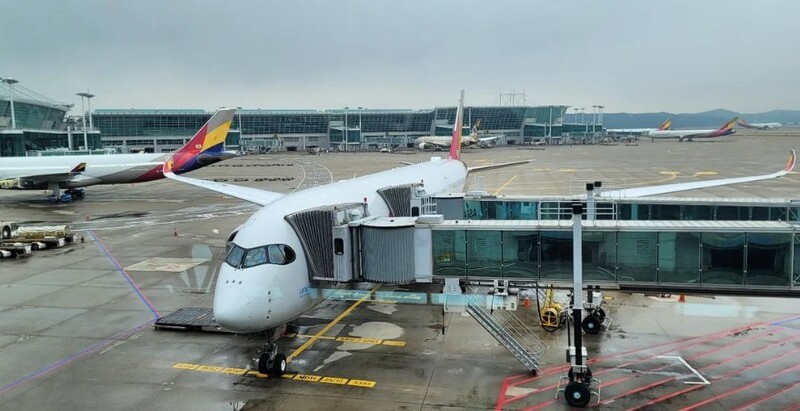 2021-10-14
2021-10-14Alone
When travel restrictions were lifted, did you take a trip? If so, where did you go and why? What are your memories of this trip? Were there any continuing COVID-19 restrictions in place? Once the Pandemic restrictions were eased, not necessarily lifted, my family and I traveled to northern Arizona, southern Nevada, southern California, and Korea. During the Pandemic, life continued on as normal for me, not so much for my spouse. I was a social worker who continued to do home visits. My spouse was an elementary educator who was able to work from home. Life during the early-, and mid-stages of the Pandemic was busy, and it felt like we were going full-speed ahead - faster than before the Pandemic. Traveling has always been my family's go-to experience; however, the Pandemic halted travel as the areas we usually go to, road trips to California, or flying to Korea, were off-limits. Once restrictions were eased, we immediately traveled to those areas to get away. Restrictions were still present, mask mandates required us to wear masks in California, and Korea. One of the memorable moments was wearing a mask for a lift, a 14-hour flight, to Korea with a one-year-old who constantly wanted to pull the mask off. Lastly, the most memorable moment throughout the whole trip to California and then off to Korea was the feeling that we were always alone, during the day or night, everything felt like a ghost town. -
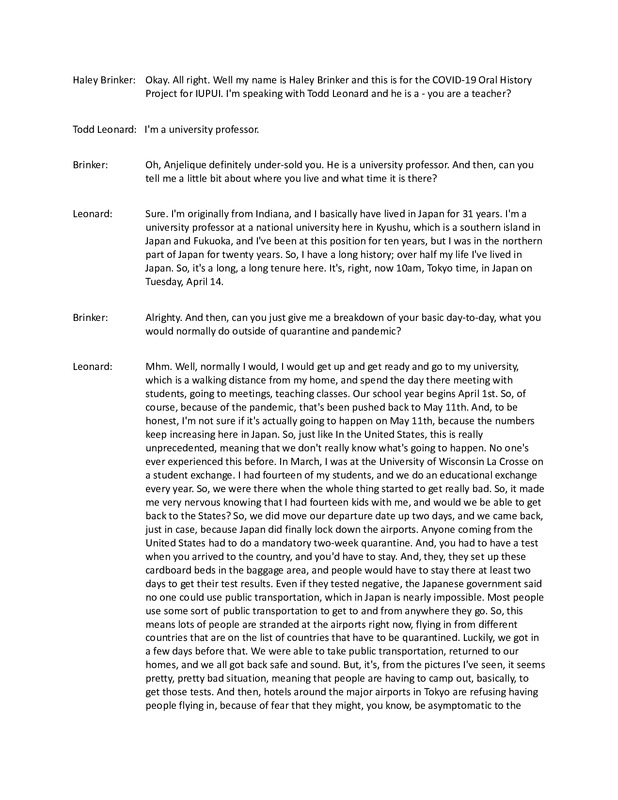 04/14/2020
04/14/2020Todd Leonard Oral History, 2020/04/14
-
2020-12-10
My pandemic mental condition
During pandemic, I was in the online English Bridge program of my university. The amount of assignments were a lot, and all I did during the pandemic was just waking up at 5am, eating break fast, going to class on zoom, eating lunch, doing assignments, eating dinner, and sleep. I could not even going grocery store to buy food or snacks because I could not finish assignments unless I just kept studying. Thus, in my room, I was alone and studying without any joy. My family supported me a lot for my study but I felt that only I was doing what I wanted (study), whereas my family was just working and doing domestic affairs. I was so depressed because if I was not existed, I did not let my family work so hard. I wanted to disappear at the time. -
2020-08-22
Finding peace during the pandemic
During the pandemic, like most people, I experienced high amounts of stress and feeling kind of hopeless. I would spend the majority of my day playing video games in my house which doesn't really seem like a bad thing to be doing, but over time I could feel myself being lost and not the same person anymore. This was because before the pandemic, I was constantly on the move and interacting with people, so when this was taken from me I was unable to resume the things that I had always done. I began school at a local university and found myself unable to make friends as I had easily done in the past, because my social skills had taken a huge fall due to the pandemic. I found myself being a really quiet person and would only talk when I was talked to, and also found that I did not have the drive to complete tasks that should have been easy to complete. The way I began to overcome this was when I joined a local dance group. They were practicing at a park following social distance regulations. I did not instantly feel comfortable because I was unsure of myself and was not very confident when I first joined. However, the group was very welcoming and friendly towards me and they gave me all of the time and space I needed at the time to begin coming out of the shell that the pandemic had formed around me. Within about a year, these members have become some of my closest friends and we hang out daily. My confidence has reached an all time high that honestly I think might have caused me to become bored whenever I know something is a waste of time but is something that I have to do. This isn't necessarily a bad thing because it is definitely an improvement from before where I would not attempt to do things because I did not feel the confidence to complete them. Had I not joined the group, I would've stayed in my shell and would not have made the friends I have today. They gave me a chance to become active again and become socially active as well. -
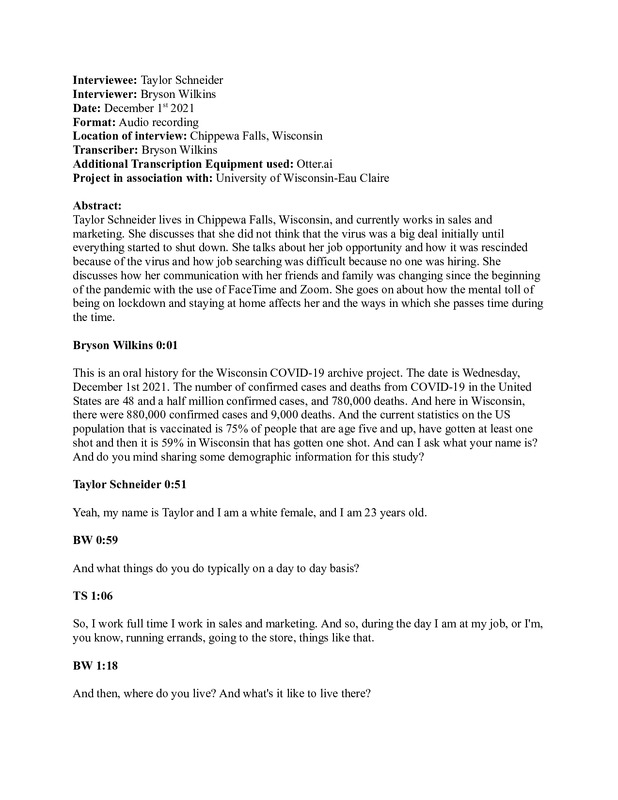 2021-12-01
2021-12-01Taylor Schneider Oral History, 2021/12/01
Taylor Schneider lives in Chippewa Falls, Wisconsin, and currently works in sales and marketing. She discusses that she did not think that the virus was a big deal initially until everything started to shut down. She talks about her job opportunity and how it was rescinded because of the virus and how job searching was difficult because no one was hiring. She discusses how her communication with her friends and family was changing since the beginning of the pandemic with the use of FaceTime and Zoom. She goes on about how the mental toll of being on lockdown and staying at home affects her and the ways in which she passes time during the time. -
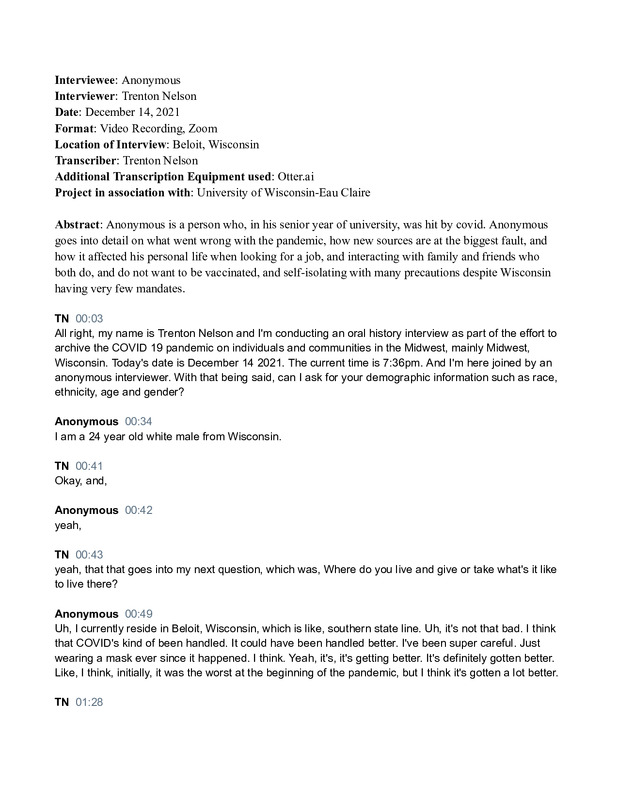 12/14/2021
12/14/2021Anonymous Oral History, 2021/12/14
Anonymous is a person who, in his senior year of university, was hit by covid. Anonymous goes into detail on what went wrong with the pandemic, how new sources are at the biggest fault, and how it affected his personal life when looking for a job, and interacting with family and friends who both do, and do not want to be vaccinated, and self-isolating with many precautions despite Wisconsin having very few mandates. -
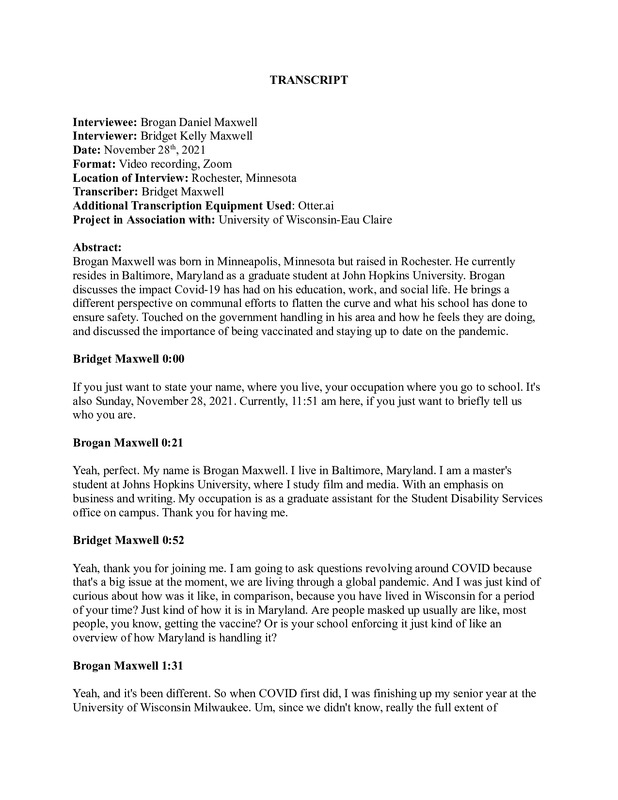 11/28/2021
11/28/2021Brogan Daniel Maxwell Oral History, 2021/11/28
Brogan Maxwell was born in Minneapolis, Minnesota but raised in Rochester. He currently resides in Baltimore, Maryland as a graduate student at John Hopkins University. Brogan discusses the impact Covid-19 has had on his education, work, and social life. He brings a different perspective on communal efforts to flatten the curve and what his school has done to ensure safety. Touched on the government handling in his area and how he feels they are doing, and discussed the importance of being vaccinated and staying up to date on the pandemic. -
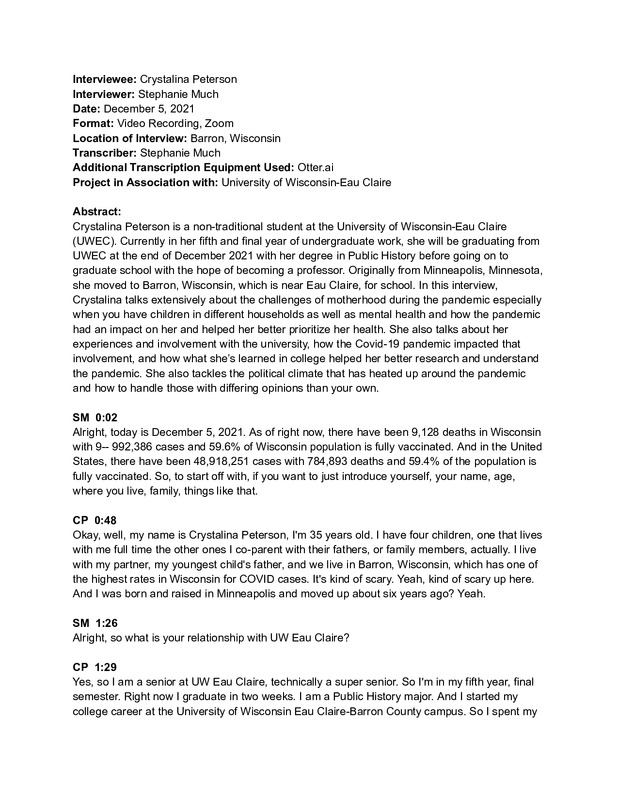 12/05/2021
12/05/2021Crystalina Peterson Oral History, 2021/12/05
Crystalina Peterson is a non-traditional University of Wisconsin-Eau Claire (UWEC) student. Currently, in her fifth and final year of undergraduate work, she will graduate from UWEC at the end of December 2021 with her degree in Public History before going on to graduate school with the hope of becoming a professor. Originally from Minneapolis, Minnesota, she moved to Barron, Wisconsin, near Eau Claire, for school. In this interview, Crystalina talks extensively about the challenges of motherhood during the pandemic especially when you have children in different households as well as mental health and how the pandemic had an impact on her and helped her better prioritize her health. She also talks about her experiences and involvement with the university, how the Covid-19 pandemic impacted that involvement, and how what she’s learned in college helped her better research and understand the pandemic. She also tackles the political climate that has heated up around the pandemic and how to handle those with differing opinions than your own.
